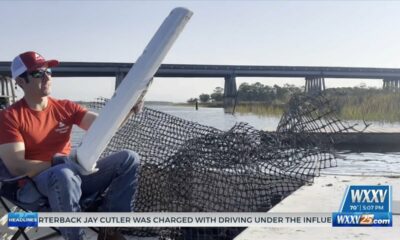Mississippi News
What’s causing the state’s slow shift to renewable energy?
The market, not climate concerns, is driving Mississippi’s slow push for renewable energy
Mississippi, a state where natural gas dominates the energy supply, may soon be turning a corner in its transition to clean and renewable energy. But amid a global effort to reduce the future impacts of climate change, the state is letting the market, not emissions, dictate that shift.
The U.S. as a whole generates about 20% of its power from renewables, which includes wind, hydropower, solar and biomass, such as wood or plants. Renewable energy sources replenish themselves more quickly than traditional energy sources like oil, gas and coal, and significantly reduce emissions that are harmful to the environment.
But in Mississippi, renewable energy generates little, if any, political excitement: A little over 2% of the net electricity utilities generate comes from renewable sources, according to the latest federal data from 2021. State lawmakers have largely ignored the climate debate, even while other state legislatures tackle the issue directly.
But all that is slowly changing in this deeply conservative state. Last November, the state’s largest utility company — Entergy Mississippi — committed to source almost a third of its power from renewables by 2027.
Entergy and other power companies are embracing such a drastic shift largely because producing renewables, especially solar energy, costs a small fraction of what it did just a decade ago. Since 2009, solar power costs have dropped about 90%, and are now cheaper than natural gas, coal and nuclear energy production.
The state’s Public Service Commission has approved several new solar projects since 2020, which combined would more than double the state’s solar capacity. The PSC is also developing programs to give renters and homeowners the ability to generate and sell their own solar power — it’s currently taking comments on an expanded net metering rule until Feb. 8, and is also starting the process to create a new community solar program.
!function(){“use strict”;window.addEventListener(“message”,(function(e){if(void 0!==e.data[“datawrapper-height”]){var t=document.querySelectorAll(“iframe”);for(var a in e.data[“datawrapper-height”])for(var r=0;r<t.length;r++){if(t[r].contentWindow===e.source)t[r].style.height=e.data["datawrapper-height"][a]+"px"}}}))}();
Simon Mahan, executive director of the Southern Renewable Energy Association, said he’s encouraged by the PSC’s recent work around renewables, which includes requiring utilities to submit annual forecasts of their future energy needs, also called Integrated Resource Plans. Mahan believes that Mississippi could soon set itself apart from other Southeastern states in its transition.
“Had you and I had this conversation a year ago, things would be really different,” he said. “But now we’re starting to see things really take off in the state, in part again because we’ve got good commissioners in Mississippi, we’ve just gone through a good process, and utilities are starting to really value renewables.
“Mississippi isn’t a (renewable energy) leader just yet, but it’s on its way.”
But clean energy advocates argue that the market-based approach is not enough, and that emissions need to play a bigger role in the state’s energy decision-making.
Jennifer Crosslin, a regional organizer for the Gulf Coast Center for Law & Policy, explained that data from the Intergovernmental Panel on Climate Change (IPCC) shows the need to drastically reduce greenhouse gas emissions by 2030 to avoid the worst effects of global warming. In the U.S., a quarter of those emissions come from the energy sector.
“We are way behind nationally, and then we look within the nation, we’re even further behind as a state,” Crosslin said.
She pointed to the way investor-owned utilities, including Entergy and Mississippi Power are structured, where their profit comes from what they spend on new projects, and lacks incentives to lower emissions.
“The way that (investor-owned utilities) are currently structured is not moving the needle fast enough,” she said. “That market-based approach is not working at all. It’s time for the state to step in.”
Looking at rising sea-levels and more powerful storms, studies project that Mississippi, along with the other Gulf states, will be one of the hardest-hit parts of the country when it comes to climate change.
Northern District Public Service Commissioner Brandon Presley, the longest-serving of the three elected PSC leaders, explained that the economy, not environmental impacts, will always steer the conversation in Mississippi.
“You have a better chance of getting these projects done because of the economic development side of it than trying to argue the merits of emissions,” Presley said.

Last month, Presley approved a new solar facility in Union County, which will power a Toyota manufacturing plant in Blue Springs.
Central District Public Service Commissioner Brent Bailey, a Republican, echoed his Democrat colleague’s sentiment.
“You do get the environmental aspect as well,” Bailey said, “but being in Mississippi, you know that’s not the primary driver for a lot of this, in my view. It’s always going to get back to the economic benefits first.”
Most states, as well as the District of Columbia, have what’s called a renewable portfolio standard (RPS), which requires that a certain share of its power generated comes from renewable sources by a certain date. Thirty states have an RPS, and another eight have a non-enforceable version of it. Mississippi is one of twelve states, including all of its neighbors and most of the South, with neither.
Presley contended that trying to pass an RPS in Mississippi is, politically speaking, a pointless effort. In most cases, RPS’ are adopted through the state Legislature.
“It wasn’t politically, practically, going to happen,” he said. “If it wasn’t going to get done, why would we waste time chasing rabbits we’re not going to catch?”
Presley added that the state was at a disadvantage in terms of being an early renewable adopter; creating new facilities often means costs get passed down to customers, which in Mississippi means spreading those costs among fewer and poorer ratepayers than in most states.
Mahan, who works with renewable developers across the Southeast, said RPS’ in other states are in part why renewable costs are so much lower now. Such a policy forces utilities to consider environmental benefits, and not just cost, he added; as it stands in Mississippi, no part of the state’s future resource planning requires power companies to weigh the emissions of different sources.
But he also said Mississippi is moving in the right direction regardless. Georgia, for instance, is seeing a surge in renewable capacity despite no legislated mandates.
“The renewable industry has shown up in the state because we believe it’s going to be a good state to do business in,” he said. “Could it have been faster with an RPS? Maybe. But again, the economics of the projects alone is what’s driving the interest in the state and the growth in Mississippi.”
Commissioner Bailey, who’s spent time visiting different schools in his district that have added rooftop solar panels, admitted that he hasn’t had much discussion with state lawmakers about creating new renewable incentives. Rather, he feels confident about the market-driven approach, and is excited about the economic spark renewables could bring to Mississippi.
“We’re excited about the opportunity, we’re excited about the investments at the local level, the revenues that can be obtained from that, and hopefully leveraging and attracting new industry to the state,” he said. “You want your state, your community, your area to be seen as innovative, and I think these are some measures that allow that.”
This article first appeared on Mississippi Today and is republished here under a Creative Commons license.
Mississippi News
Ole Miss women get pair of double-doubles and roll to 83-65 March Madness win over Ball State
SUMMARY: Mississippi coach Yolett McPhee-McCuin found solace in returning to a different arena in Waco, Texas, following a disappointing previous tournament experience. The No. 5 seed Ole Miss Rebels redeemed themselves with an 83-65 victory over 12th-seeded Ball State in the NCAA Tournament’s first round. Starr Jacobs led the Rebels with 18 points and 11 rebounds, while Kennedy Todd-Williams and Madison Scott each scored 15 points. Ole Miss dominated rebounding, leading 52-32, and will face fourth-seeded Baylor next. Coach McPhee-McCuin noted the team’s evolution since their last visit and the significance of playing in Texas, where Jacobs feels at home.
The post Ole Miss women get pair of double-doubles and roll to 83-65 March Madness win over Ball State appeared first on www.wjtv.com
Mississippi News
Events happening this weekend in Mississippi: March 21-23
SUMMARY: This weekend (March 21-23), Mississippi offers a range of exciting events. Highlights include Hal’s Marching MALfunction Second Line Stomp and Jessie Robinson’s blues performance in Jackson, as well as the Natchez Food & Wine Festival and the Natchez Little Theatre’s production of *This Side of Crazy*. There are also numerous exhibitions like *Of Salt and Spirit: Black Quilters in the American South* in Jackson and *Gold in the Hills* in Vicksburg. Other events include the 48th Annual Crawfish Classic Tennis Tournament in Hattiesburg, karaoke nights in Laurel, and a variety of family-friendly activities across the state.
The post Events happening this weekend in Mississippi: March 21-23 appeared first on www.wjtv.com
Mississippi News
Events happening this weekend in Mississippi: March 14-16
SUMMARY: This weekend (March 14-16) in Mississippi offers a variety of events. In Jackson, iconic saxophonist Boney James performs at the convention center, while the JXN Food & Wine festival showcases culinary talents. The LeFleur Museum District hosts a “Week of Wonder,” and several exhibitions, including “Of Salt and Spirit,” celebrate Black quilters. Natchez features the Spring Pilgrimage tours, a reenactment of Annie Stewart’s story, and a St. Patrick’s Day celebration. In Hattiesburg, comedian Rob Schneider performs, and various events like a St. Patrick’s Day pub crawl and a talent show will take place throughout the area.
The post Events happening this weekend in Mississippi: March 14-16 appeared first on www.wjtv.com
-

 Mississippi Today2 days ago
Mississippi Today2 days agoPharmacy benefit manager reform likely dead
-

 News from the South - Alabama News Feed7 days ago
News from the South - Alabama News Feed7 days agoSevere storms will impact Alabama this weekend. Damaging winds, hail, and a tornado threat are al…
-

 News from the South - Alabama News Feed6 days ago
News from the South - Alabama News Feed6 days agoUniversity of Alabama student detained by ICE moved to Louisiana
-

 News from the South - Oklahoma News Feed5 days ago
News from the South - Oklahoma News Feed5 days agoTornado watch, severe thunderstorm warnings issued for Oklahoma
-

 News from the South - Virginia News Feed6 days ago
News from the South - Virginia News Feed6 days agoYoungkin removes Ellis, appoints Cuccinelli to UVa board | Virginia
-

 News from the South - Kentucky News Feed7 days ago
News from the South - Kentucky News Feed7 days agoA little early morning putting at the PGA Tour Superstore
-

 News from the South - Georgia News Feed5 days ago
News from the South - Georgia News Feed5 days agoGeorgia road project forcing homeowners out | FOX 5 News
-

 News from the South - West Virginia News Feed6 days ago
News from the South - West Virginia News Feed6 days agoHometown Hero | Restaurant owner serves up hope
















































